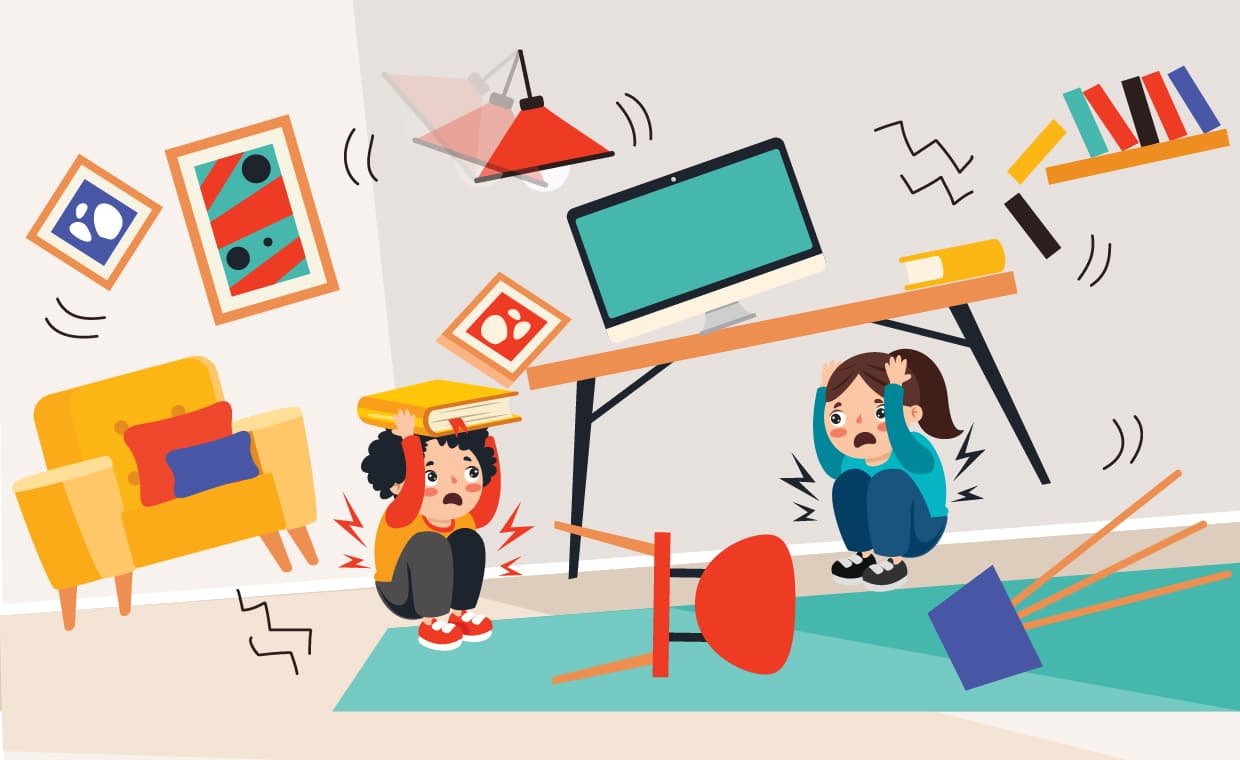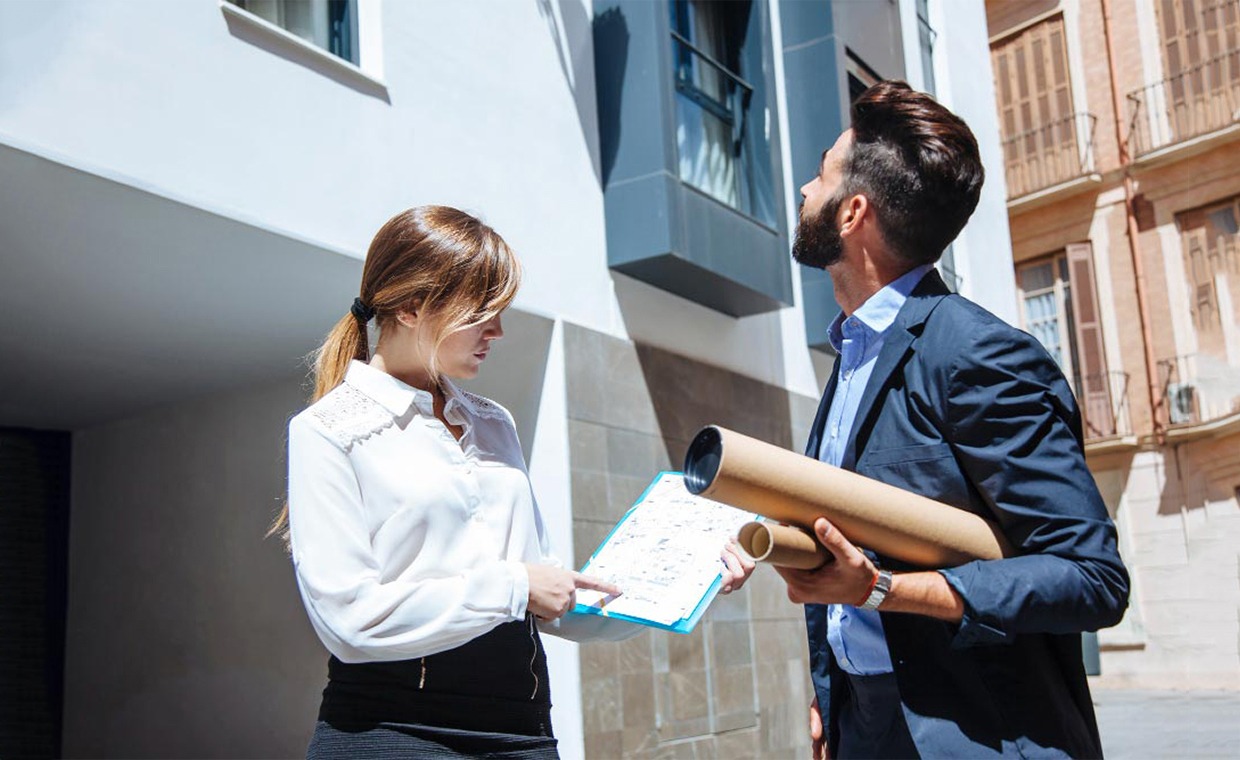
In less than a minute, an earthquake of high magnitude can erase the existence of humans and other elements on Earth. The damage done by any natural disaster depends on its scale, intensity, and magnitude. The higher the intensity or magnitude, the higher the loss of life and property. We cannot fight back against earthquakes; whether they occur on the earth or in the ocean. The only way is to cope with it, strive to stay safe during an earthquake, and try to reduce the extent of the after-effects by helping the earthquake-affected people. Gharpedia gives you guidelines on how to protect yourself during an earthquake.
What is an Earthquake?

An earthquake is a sudden and violent shaking of the ground caused by the movement of rocks deep under the earth’s surface. Earthquakes can start fires, tsunamis, landslides, and avalanches.
Earthquakes are one of the most lethal natural disasters. Every year, there are approximately 100 earthquakes of magnitude strong enough to inflict significant damage. They strike without warning, and many of the Earth’s earthquake zones are in densely populated places. When big earthquakes strike such locations, the consequences can be disastrous.
It is almost impossible to forecast the occurrence of earthquakes. Thus, getting an idea about what to do during an earthquake is the only hope.
Understand the difference between magnitude and intensity of earthquake with our guide:
Difference between Magnitude and Intensity of Earthquake!
How to Protect Yourself During An Earthquake?

We can stay safe during an earthquake by using the drop-cover-hold technique correctly. The drop-cover-hold method is the best technique to reduce earthquake-related injuries and deaths.
When an earthquake strikes, the first thing is to stay calm and not panic, and then implement the drop-cover-hold technique.
A. Drop
- DROP down to the floor before the earthquake knocks you down.
B. Cover
- Take cover under a sturdy piece of furniture.
- If there is no nearby table or desk, cover your face and head with your arms and squat in an interior corner of the building.

- Do not stand near windows, hanging objects, mirrors, or tall furniture.
C. Hold
- If you take cover under a sturdy piece of furniture, hold it and be prepared to move with the piece of furniture.
- Hold the position until the ground stops shaking, and it is safe to move.
- If you can’t get under something strong, flatten yourself or crouch against an interior wall.
- If you are in your classroom, get under the desk. Face away from the window.
Stay indoors until the tremor ceases and it is safe to venture outside. According to research, most injuries occur when people inside buildings seek to relocate to a different area or exit.
Be aware that the power may go out or that sprinkler systems or fire alarms may activate.
The drop-cover-hold method is effective indoors, but just in case you are outside, remember:
- You need to stay outside and not make attempts to go indoors.
- Try to go to an open area, away from the buildings.
- If you are in a crowded location, make sure you take cover in a place where you do not face the threat of being trampled.
If you are in a vehicle, then:
- Locate a safe place and clear the road off for emergency and rescue vehicles.
- It is always advisable to stay inside the vehicle.

- Do not venture out of the car if downed power lines are across it (stay at least ten mts away from downed power lines). Wait for the rescue team to approach you.
- Place the HELP sign on your window.
- If you are on public transport, take cover in a protected place. If this is not possible, sit in a crouched position and protect your head from falling debris.
These tips ensure safety during an earthquake.
Common Earthquake Safety Tips
Following are some general safety tips to protect yourself during an earthquake.
1. If you are in a high-rise building, and you are not near a desk or table, go against an interior wall and protect your head with your arms.
2. If you are standing outside, go to a clear area away from trees, buildings, signs, downed electrical wires, and poles.
3. If you are on a sidewalk near buildings, move into a doorway to protect yourself from falling glass, brick, plaster, and other debris.
4. If you are driving, go to the side of the road and stop. Avoid overpasses and other hazards. Stay inside the vehicle until the shaking is over.
5. If you are in a crowded store, do not rush to the exit. Stay away from display shelves containing objects that could fall.
6. It is a challenge for disabled people to stay safe during an earthquake. If you are in a wheelchair, stay in it. If possible, move to cover, lock your wheels, and protect your head with your arms.
7. If you are in the kitchen, stay away from the refrigerator, stove, and overhead cupboards.
8. If you are in a stadium or theatre, stay in your seat and protect your head with your arms. Do not try to leave until the shaking is over.
9. If you are in an elevator, hit the button for every floor and get out as soon as you can.
Not all earthquakes are deadly, get more information in our below article:
Are All Earthquakes Killer One?
Takeaway: Awareness is the Key
An earthquake can happen without any prior notification. Further, since it is very difficult to predict this natural disaster, having enough awareness on it can be a big blessing. Simple planning at home can help you reduce the impact of the earthquake. When we talk of preparations, the first thing that comes to mind is designing natural calamity-resistant structures. However, from an individual’s perspective, preparation can also mean staying aware and making family members and friends understand the techniques to ensure safety during an earthquake.
The preparations to face an earthquake start with securing your home! Firstly, get to know the local seismic building standards to reduce the impact in case there is an earthquake. Discuss the above-mentioned earthquake safety tips with family members. Remember, it is impossible to avert earthquakes, but you can handle their impact on you and your family efficiently with awareness.
Lastly, it is essential to be prepared for any disaster before it affects you. Store or ensure the stock of the extra water, food, first aid kit, and important documents of family members. According to LiveScience, winner of the 2008 and 2010 Webby Awards, scientists can predict where major tremors might occur in a general sense, but research does not yet allow forecasts for specific locations or accurate predictions of timing. The uncertainty of an earthquake leaves everyone frightened and panic-stricken. Thus, it is important to stay calm during the earthquake and follow the aforementioned earthquake safety tips.
Experiencing an earthquake can be traumatic, but it is important to stay calm and follow the below tips on dos and don’ts after an earthquake:






























